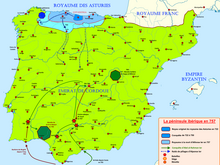
Flávio Alarico, also known as Flávio Atanarico de Coimbra (c.715 - c.760) was a nobleman and 3rd Count of Coimbra.[1][2][3][4] His title as Count of Coimbra positioned him as a significant figure in the region, as Coimbra became a key area in the Christian Reconquista and the eventual establishment of the Kingdom of Portugal.
Coimbra, like many other cities in early Al-Andalus, had a significant Christian population (known as Mozarabs), who were allowed to maintain their faith in exchange for paying the jizya (a tax levied on non-Muslims).[5][6] The use of "count" (comes) in his title, a remnant of Visigothic nobility, reflects the continuation of older Roman and Gothic administrative traditions in the city.
Biography
Flávio was the son of Flávio Sisebuto de Coimbra (Judge of Coimbra).[1] He married Toda (or Teuda) and they had a son: Flávio Teodósio (c.740 - 805).[1][7]
References
- ^ a b c Rei, Antonio (2014). "Os Condes de Coimbra no século VIII". Armas e Troféus: Revista de História e de Arte: 295–311.
- ^ "FamilySearch.org". ancestors.familysearch.org. Retrieved 2024-10-16.
- ^ Manuel José da Costa Felgueiras Gaio, Nobiliário de Famílias de Portugal, Impressão diplomática do original manuscrito existente na Santa Casa de Misericórdia de Barcelos, Portugal, No.1181775/Tomo 5/Tit.Barbosas/Pag.10/Parag.1/N5., Microfilmes No.s 1181775 a 1181777.
- ^ Carriço, Hugo Miguel. O OCIDENTE NA POLITICA ASTURIANO-LEONESA 711-1037.
- ^ Lévi-Provençal (1967-06-01). Histoire de l'Espagne musulmane. BRILL. doi:10.1163/9789004619098. ISBN 978-90-04-61909-8.
- ^ Crow, Karim Douglas (2009-12-15). "David Levering Lewis - God's Crucible: Islam and the Making of Europe, 570-1215". ICR Journal. 1 (2): 367–371. doi:10.52282/icr.v1i2.756. ISSN 2041-8728.
- ^ "Flávio Alarico Atanarico DE COIMBRA". sites.rootsmagic.com. Retrieved 2024-10-16.








